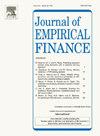Exploring the non-linear dynamics between Commercial Real Estate and systemic risk
IF 2.4
2区 经济学
Q2 BUSINESS, FINANCE
引用次数: 0
Abstract
The commercial real estate (CRE) market significantly influences financial stability, given its size, use as collateral, and cyclicality. This study explores macro-financial vulnerabilities arising from the CRE market, revealing that adverse developments in CRE capital values amplify systemic risk across financial sub-sectors, namely, banks, insurance companies and investment trusts, consistent with the collateral channel hypothesis. The CRE and financial markets relationship, however, displays nonlinearities. We introduce a UK CRE Misalignment index which integrates various market indicators to assess deviations from fundamental values in the CRE sector. We find that during market misalignments, the link between systemic risk and CRE growth weakens, suggesting that further property price increases in an overheated market could lead to a bubble and heightened systemic risk, in line with the deviation hypothesis. Finally, we employ a quantile regression model that captures another aspect of this non-linear relationship. We find that positive (negative) developments in the CRE market decrease (increase) the right tail of the historical systemic risk distribution, but CRE variation has a weak impact on the left tail and cannot effectively reduce systemic risk in periods of growth.
探讨商业地产与系统性风险之间的非线性动态关系
商业房地产(CRE)市场显著影响金融稳定,因为它的规模,用作抵押品,和周期性。本研究探讨了商业地产市场产生的宏观金融脆弱性,揭示了商业地产资本价值的不利发展放大了金融子行业(即银行、保险公司和投资信托公司)的系统性风险,这与抵押品渠道假设相一致。然而,CRE和金融市场的关系表现出非线性。我们介绍了英国商业地产失调指数,该指数整合了各种市场指标,以评估商业地产行业偏离基本价值的情况。我们发现,在市场失调期间,系统性风险与CRE增长之间的联系减弱,这表明在过热的市场中,房地产价格的进一步上涨可能导致泡沫和系统性风险加剧,符合偏差假设。最后,我们采用了一个分位数回归模型来捕捉这种非线性关系的另一个方面。我们发现,CRE市场的积极(消极)发展减少(增加)了历史系统性风险分布的右尾,但CRE变化对左尾的影响较弱,不能有效地降低增长时期的系统性风险。
本文章由计算机程序翻译,如有差异,请以英文原文为准。
求助全文
约1分钟内获得全文
求助全文
来源期刊

Journal of Empirical Finance
Multiple-
CiteScore
3.40
自引率
3.80%
发文量
59
期刊介绍:
The Journal of Empirical Finance is a financial economics journal whose aim is to publish high quality articles in empirical finance. Empirical finance is interpreted broadly to include any type of empirical work in financial economics, financial econometrics, and also theoretical work with clear empirical implications, even when there is no empirical analysis. The Journal welcomes articles in all fields of finance, such as asset pricing, corporate finance, financial econometrics, banking, international finance, microstructure, behavioural finance, etc. The Editorial Team is willing to take risks on innovative research, controversial papers, and unusual approaches. We are also particularly interested in work produced by young scholars. The composition of the editorial board reflects such goals.
 求助内容:
求助内容: 应助结果提醒方式:
应助结果提醒方式:


